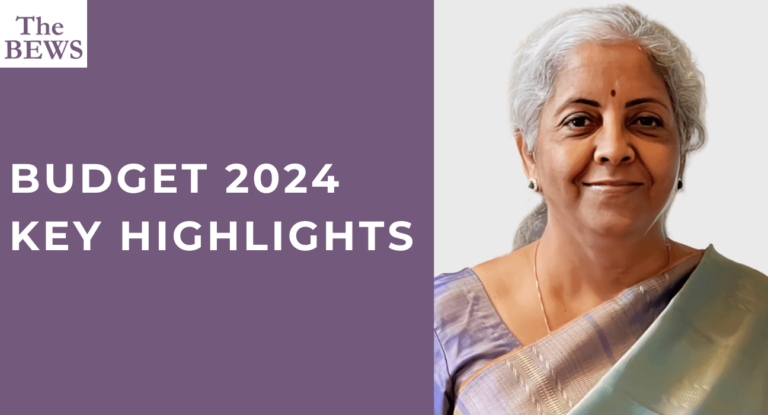The Finance Minister, Nirmala Sitharaman, recently presented the budget for the upcoming financial year (2024-25). Since it’s the last one before the Lok Sabha elections, it’s considered an interim budget. Notably, there were no changes in tax slabs. Nirmala Sitharaman, the Union Finance Minister, suggested maintaining the existing tax rates for both direct and indirect taxes, encompassing import duties.
The fiscal deficit target for 2024-25 is set at 5.1% of the Gross Domestic Product (GDP). The next complete budget is expected in July after the new government is sworn in following the Lok Sabha elections. Read on further to know the complete highlights of the budget.
Highlights
In the recent presentation of the Interim Budget 2024-25, Union Finance Minister Nirmala Sitharaman highlighted the government’s commitment to inclusive and pervasive development. Aimed at all castes and people at every level, the vision is to transform India into a developed nation by 2047. Despite challenges in 2024, the government, guided by the mantra ‘Sabka Sath Sabka Vikas,’ has made significant strides. The focus remains on four key groups: the poor, farmers, youth, and women.
Updated Fiscal Deficit
The updated fiscal deficit, which is the difference between what the government earns and spends, is now 5.8% of the GDP for 2023-24. Looking ahead to 2024-25, it’s expected to be 5.1% of the GDP. The goal is to bring the fiscal deficit down to less than 4.5% of the GDP by 2025-26. Also, there aren’t any alterations to the income tax slabs.
Tax Filings Increase
According to Sitharaman, the number of people filing taxes has increased by 2.4 times. The money collected through direct taxes has tripled since 2014. For the year 2024-25, the expected tax receipts are around Rs 26.02 lakh crore.
Big Move on Tax Demands
In a significant decision, the government has chosen to cancel pending direct tax claims, clearing dues up to Rs 25,000 for the period until the financial year 2009-10, and up to Rs 10,000 for the financial years from 2010-11 to 2014-15.
Housing Scheme Boost
In a significant move, the Finance Minister revealed plans to add 2 crore additional houses to the Pradhan Mantri Awas Yojana – Gramin (PMAY-G).
Tech Boost for Youth
A special fund of Rs 1 lakh crore, offered as a 50-year interest-free loan, was announced aiming to empower our tech-savvy youth. This fund encourages extensive research and innovation in cutting-edge fields with low or no interest rates, paving the way for a golden era.
Empowering Defense Tech
A new initiative will be set to fortify deep tech for defense, fostering self-reliance (atma nirbharta) and speeding up innovation. It’s all about combining our youth’s potential with advanced technology for a stronger and more self-sufficient nation.
Railway Corridor Boost
The Finance Minister revealed a groundbreaking plan to enhance passenger train operations. The scheme includes three key economic railway corridors: energy, mineral, and cement corridors, port connectivity corridors, and high-traffic density corridors. With a focus on improving logistics efficiency and reducing costs, this initiative aims to ease congestion on busy routes, enhancing safety and increasing travel speed for passengers. The overall impact is expected to lower logistics costs significantly.
Medical College Expansion
The Finance Minister unveiled a plan to establish more medical colleges by utilizing existing hospital infrastructure across departments. A dedicated committee will assess issues and provide recommendations.
Women’s Empowerment Milestones
FM highlighted triple talaq, reserving 1/3rd of seats for women in Lok Sabha and state assemblies. Over 70% of rural houses under PM Awas Yojana will now be allocated to women, promoting dignity.
Solar Power for Homes
In a green move, the government aims to enable 1 crore households to receive up to 300 units of free electricity monthly through rooftop solarisation. Aligned with the Prime Minister’s vision, this step contributes to the goal of achieving ‘net zero’ by 2070.
Tourism Boost Initiative
To stimulate tourism, states will receive long-term interest-free loans for development, fostering growth in this sector.
Decade of Positive Economic Change
Commencing her speech, Sitharaman emphasized the positive transformation witnessed in the Indian economy over the last 10 years.
Inclusive Growth Focus
The Finance Minister declared a commitment to guiding the country’s growth based on the needs and aspirations of the poor, women, youth, and farmers.
Viksit Bharat
Announcing a bold vision, the government aims to transform India into ‘Viksit Bharat’ by 2047, emphasizing inclusive development with a focus on everyone’s progress.
Triple Focus on GDP
Sitharaman highlighted the government’s equal focus on GDP, standing for Governance, Development, and Performance, ensuring a holistic approach to economic well-being.
Economic Growth Projections
In an interim budget preview, the Ministry of Finance anticipates the Indian economy’s growth surpassing 7% in the coming years. It envisions India becoming the world’s third-largest economy in three years, boasting a GDP of $5 trillion.
PM Jan Dhan Yojna
The Finance Minister highlighted the government’s transfer of Rs 34 lakh crore directly to citizens via PM Jan Dhan accounts, resulting in a substantial savings of Rs 2.7 lakh crore. These savings were achieved by preventing previous leakages. Sitharaman emphasized that these additional funds enable further support for the welfare of the underprivileged through the Garib Kalyan initiative.
Ayushman Bharat
In a significant move, Finance Minister Sitharaman declared the extension of Ayushman Bharat coverage to include all Anganwadi and Asha workers. Additionally, she revealed plans to consolidate all maternal and child healthcare schemes into a comprehensive program for more effective and streamlined support.
Final Thoughts
The primary emphasis will be on preserving the current state of affairs, ensuring policy continuity remains a top priority. The government will prioritize boosting investment growth. She also highlighted that the government successfully lifted 250 million people out of poverty. Additionally, the crop insurance scheme has extended its benefits to empower 40 million farmers. These were the main highlights of the interim budget presented on 1st Feb by our Finance Minister.



